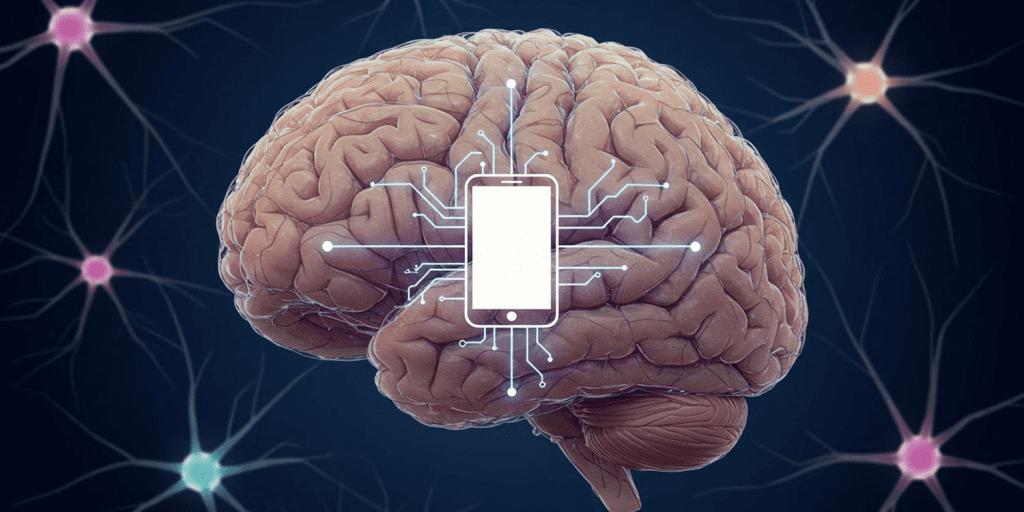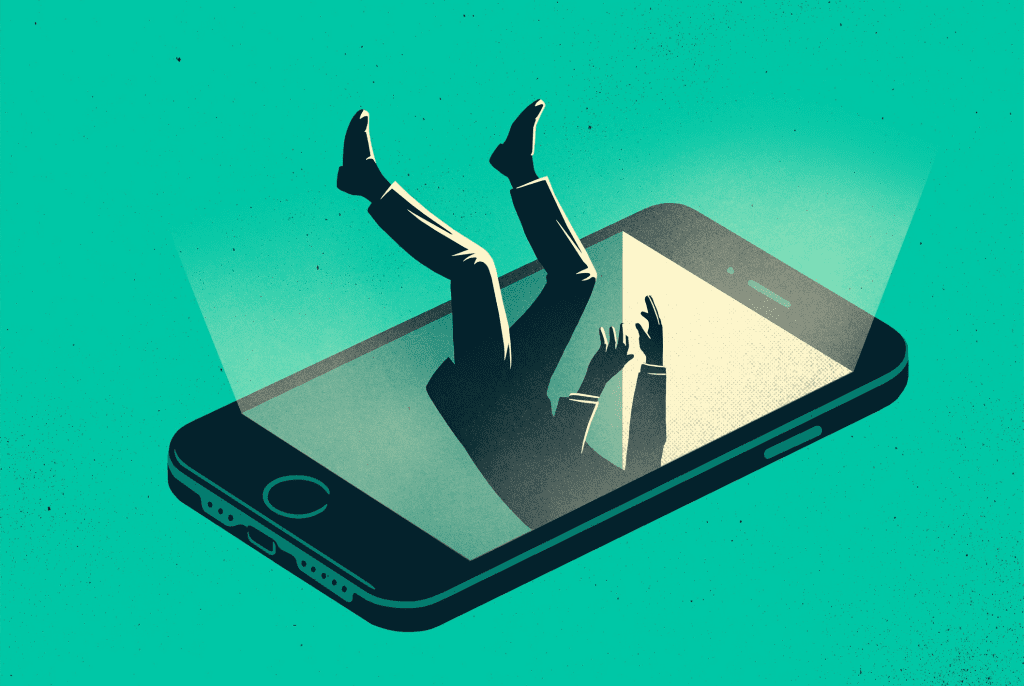Smartphones have become an inseparable part of modern life, revolutionizing communication, work, and entertainment. However, excessive smartphone use (ESU) has been linked to various negative consequences, including addiction-like behaviors, impaired mental health, and diminished attention spans. Recent studies suggest that smartphone-related cues can trigger neural responses similar to those seen in substance addiction, reinforcing compulsive usage patterns. Understanding the effects of smartphone restriction on cue-related neural activity can provide valuable insights into developing interventions for individuals struggling with ESU.
The Role of Cue Reactivity in Smartphone Use

Cue reactivity (CR) refers to the brain’s response to stimuli associated with a habitual or addictive behavior. In the case of smartphone use, cues may include notification sounds, phone screens lighting up, or simply seeing a smartphone in one’s environment. These cues can activate reward-related brain regions, reinforcing the compulsive urge to check the device.
Research has shown that individuals with excessive smartphone use exhibit heightened neural responses to smartphone-related cues, similar to those observed in substance addiction. This heightened sensitivity may contribute to difficulty in controlling smartphone usage, leading to a cycle of compulsive checking and craving.
Investigating Neural Activity Changes Through Smartphone Restriction
To better understand how short-term smartphone restriction influences brain activity, researchers conducted a study using functional MRI (fMRI) to measure changes in cue-related neural responses over 72 hours of smartphone abstinence. The study involved 25 young adults who were regular smartphone users.
Video : What Happens To Your Brain When You Mindlessly Scroll?
Study Design and Methods
- Participants were instructed to refrain from using their smartphones for 72 hours.
- A cue-reactivity task was designed, where participants were exposed to images of smartphones (both active and inactive) as well as neutral objects.
- Functional MRI scans were conducted before and after the restriction period to analyze changes in brain activity.
- Psychometric assessments were used to measure craving, self-control, and emotional responses associated with smartphone use.
Key Findings: How the Brain Adapts to Smartphone Restriction
1. Reduced Activation in the Reward System
One of the most striking findings was a significant reduction in activity in the nucleus accumbens and anterior cingulate cortex after 72 hours of smartphone restriction. These brain regions are heavily involved in reward processing and habit formation.
- The nucleus accumbens is associated with motivation and reinforcement learning. High activation in this area suggests strong craving and compulsive behavior.
- The anterior cingulate cortex plays a role in decision-making and impulse control. Reduced activity here indicates that participants may have experienced less compulsion to check their smartphones.
These findings suggest that even a short break from smartphone use can lead to neuroplasticity, allowing the brain to become less reactive to smartphone-related cues.
2. Alterations in Dopamine and Serotonin-Linked Activity
Further analysis using neurotransmitter probability maps revealed that activity changes in the reward system were closely linked to dopamine and serotonin receptor probabilities.
- Dopamine is a key neurotransmitter in reward-seeking behavior and addiction.
- Serotonin is involved in mood regulation and impulse control.
The findings suggest that smartphone restriction may influence neurochemical processes that drive compulsive behaviors. This could explain why some people feel withdrawal-like symptoms, including restlessness and anxiety, when they suddenly stop using their phones.

3. Increased Engagement of the Parietal Cortex
Another notable result was the increased activity in the parietal cortex, a region associated with attentional control and sensory processing.
- This suggests that participants became more aware of their environment and less preoccupied with smartphone-related distractions.
- Heightened parietal cortex activity was correlated with reduced craving scores, indicating improved cognitive control over impulsive smartphone use.
This supports the idea that limiting smartphone use can enhance focus and attentional regulation, reducing dependency on digital devices.
4. Reduced Compulsive Checking Behavior
Behavioral assessments showed that participants experienced a significant decrease in the urge to check their smartphones over time. This aligns with the observed neural changes in reward sensitivity and impulse control.
Participants also reported improvements in:
- Sleep quality: Reduced exposure to blue light and nighttime scrolling led to better sleep patterns.
- Social interactions: Without constant phone distractions, participants engaged more with people around them.
- Mental well-being: Several individuals noted feeling less anxious and more present in their daily activities.
Implications for Smartphone Addiction and Digital Detox Strategies

The findings of this study have significant implications for individuals struggling with excessive smartphone use. While a complete break from smartphones may not be feasible for everyone, implementing digital detox strategies can help manage usage and mitigate negative effects.
1. Scheduled Smartphone Breaks
- Taking regular breaks from smartphone use, even for a few hours a day, can help reset neural responses to digital cues.
- Setting specific times for checking messages rather than responding to every notification can reduce compulsive checking.
2. Mindful Technology Use
- Practicing conscious smartphone use by turning off unnecessary notifications and using grayscale mode can help decrease reliance on digital stimuli.
- Engaging in non-digital hobbies, such as reading, exercise, or meditation, can strengthen attention control and reduce smartphone dependency.
3. Sleep Hygiene and Nighttime Restrictions
- Avoiding smartphone use one hour before bed can improve sleep quality by preventing blue light exposure.
- Using do not disturb or airplane mode at night can minimize the temptation to check notifications.
4. Awareness Campaigns and Education
- Schools, workplaces, and mental health professionals can promote awareness of the impact of excessive smartphone use on brain function.
- Implementing digital wellness programs can encourage balanced technology use.
Video : Cell Phones Affect Brain Activity

Conclusion: How Smartphone Restriction Reshapes the Brain
The study provides compelling evidence that even a short period of smartphone restriction can lead to measurable changes in brain activity. The observed reductions in reward-related neural responses, coupled with increased attentional control, suggest that limiting smartphone use can promote cognitive flexibility, impulse control, and overall mental well-being.
As smartphone addiction continues to be a growing concern, understanding the neurological basis of cue-reactivity and digital dependency is crucial. These findings highlight the importance of incorporating healthy technology habits to ensure that smartphones remain tools for convenience rather than sources of compulsive behavior.
By making small adjustments in smartphone usage, individuals can foster better focus, improved mental clarity, and greater overall life satisfaction. So, why not start with a 72-hour break and see how your brain adapts?
Bride Doesn’t Want Her Dad in Wheelchair to Walk Her Down the Aisle until She Sees Him on TV — Story of the Day

Bride Doesn’t Want Her Dad in Wheelchair to Walk Her Down the Aisle until She Sees Him on TV — Story of the Day
A woman doesn’t want her father to walk her down the aisle because she is embarrassed by his wheelchair. However, when she sees him on TV a few days before the wedding, she regrets her decision and changes her mind.
When Lisa Terrell’s mother died when she was just two years old, her father, Edward, took up her care. Caroline Terrell had died in a terrible hurricane that hit their town years ago, demolishing their home and leaving Edward in a wheelchair due to a severe injury.
Nonetheless, nothing could stop Edward from raising Lisa with love and giving her the finest of everything. He was a well-known journalist and began working remotely following his injury to provide for them.
However, most people in Lisa’s life were unaware she had a father until he paid her a surprise visit at her school one day.
Lisa had always told her friends that her father was too busy to spend time with her, which is why he never attended school functions or parent meetings. However, the reality was that the invitations never made it to Edward since Lisa was embarrassed by him and didn’t want her friends to see him.
She adored him as a youngster, but as she grew up, the image of her father in a wheelchair mortified her and wrecked her relationship with him.
She was confused as she looked at the television and noticed her father sitting alongside the host.
Still, Edward never reneged on his duties. He was always there for his daughter and saved enough money to send her to a top university.
On the other hand, Lisa did not want him by his side. In fact, when she met her boyfriend, Harrison, at university, and they decided to marry after graduation, she didn’t want Edward to be there for the wedding.
As a result, she freaked out when Harrison asked her to invite Edward to dinner at his parents’ place. His parents were wealthy and of the upper crust. What would they think if they saw an elderly man in their home in a wheelchair? Lisa was ashamed by the very thought of it.
However, based on Harrison’s enthusiasm in inviting Edward to dinner, Lisa realized she didn’t have an out this time. So she had to fake a grin and say she’d ask Edward if he was free.
When Lisa told Edward about the invitation to dinner, he was more than just free. He was overjoyed for Lisa for finding someone who adored her.
On the night of the dinner, he dressed nicely in a suit and Harrison’s family received him warmly. The young man’s parents were impressed that Edward had reared a daughter on his own. Besides, Edward had a wonderful sense of humor, and everyone had a great time at the dinner. Everyone except Lisa, whose cheeks were flushed crimson with shame the entire time since the man in a wheelchair was her father…
A few weeks before the wedding, Lisa made up her mind. She confronted Edward one night over dinner and notified him that he would not be on the wedding guest list.
“Dad, I wanted to talk to you about the wedding,” she began, glancing at her plate and moving her fork around the spaghetti.
“Yes? What exactly is it, honey?” Edward inquired. “Is there something bugging you about the wedding, the expenses? If that’s the case, I have some bonds that we could use. After all, I did keep it for you…”
“No, dad! It’s just that,” Lisa paused for a moment, “Harrison and I intend to hold the wedding here in New York, but the problem is that we’re having it at one of the city’s largest hotels, and… I just thought it would be best if you didn’t attend the event. You know, there would be way too many guests!”
Edward’s smile vanished as he stared at Lisa, speechless. “I – I don’t understand…What’s the problem?”
Lisa sighed and fixed her gaze on him. “Look, Dad, it’s just that… The guests will be exclusive, and they’re all businessmen and high-class people. Imagine a man in a wheelchair walking his daughter down the aisle in front of them… I don’t know…It’s just weird.”
“A man in a wheelchair is weird?” Edward’s eyes welled up. He couldn’t believe Lisa was indirectly cutting him off the wedding guest list. But he grasped the cue and forced a grin, hiding his tears from her.
“Is that it? Oh, you’re right! After all, this old age is catching up with me,” he said, faking a laugh. “I may not be able to handle such a large gathering. It’s ok – it’s ok!”
“Thanks for understanding, dad,” Lisa said bluntly and went away to her room. Before dissing Edward, she didn’t think twice about all the years of love and care he’d given her, but eventually, she regretted it.
A few days later, she was watching a show titled “American Heroes” on TV when the emcee announced Edward’s name. She was confused as she looked at the television and noticed her father sitting alongside the host.
Soon after, the camera focused on a screen that displayed images of Edward in a wheelchair and the hurricane that had hit their town years before. He turned out to be one of the brave journalists who had managed to save his family and help his neighbors throughout the disaster.
Edward had a solemn expression as he narrated the whole story of how he’d managed to help people, especially his family.
“I will never forget that day. It was terrible… we lost practically everything,” he explained. “My wife died in the accident, and my daughter was just two years old at the time. As the debris surrounding us fell, I noticed my daughter standing right there…underneath that spot where it was falling.
“I went to save her and took her into my arms, but as I ran, a large section of the ceiling cracked and crashed on my back, causing a spine injury that prevented me from walking again.”
Lisa’s jaw sank to the floor, and her tears welled up when she heard that. “Dad saved me?” she was shocked.
“It was hard for me,” Edward continued. “But you know, you can’t really avoid your fate. So I gathered courage, knowing I just couldn’t give up in life, especially because I know I had a daughter who was now reliant on her father.”
Lisa was utterly embarrassed about herself at this point. She cried after Edward’s interview, cursing herself for being a terrible daughter, and decided to make it up to him.
So on her wedding day, she did walk down the aisle with Edward, but before the wedding ceremony began, she needed to tell the guests something VERY important…
As she took the microphone near the altar, she approached Edward, who was sitting among the guests, fell on her knees, and hugged him. “I know this is one of the most important days of my life, and I’ve been waiting for it for so long!” she cried, holding his hands in hers. “But none of this would have been possible if my father had not been by my side.”
“Ever since mom passed away, I never saw dad saying even once how hard it was for him to raise me alone. He did have hard days, but he never showed me the slightest hint of it. But what did I do? I was about to remove him from the wedding list because I was embarrassed about him being in a wheelchair. Yes, that’s right!”
“If only I had known that dad is in a wheelchair because he injured his back while saving me, I’d have never ever done that. I have been horrible to the man who loves me the most!”
“So I’d like to apologize to him in front of everyone today. I apologize for being the worst daughter to you, dad,” she said, facing him. “You can hate me for the rest of my life. I am sorry.”
Edward wasn’t expecting Lisa to own her mistake publicly. He was surprised but at the same time overcome with emotions at seeing his daughter realize her error, so he forgave her.
“Oh, come here,” he cried, embracing her. “Everyone makes mistakes,” he said. “But if you recognize them and work to fix them, you should be forgiven.”
Everyone was moved to tears and applauded the heartwarming reunion.



Leave a Reply